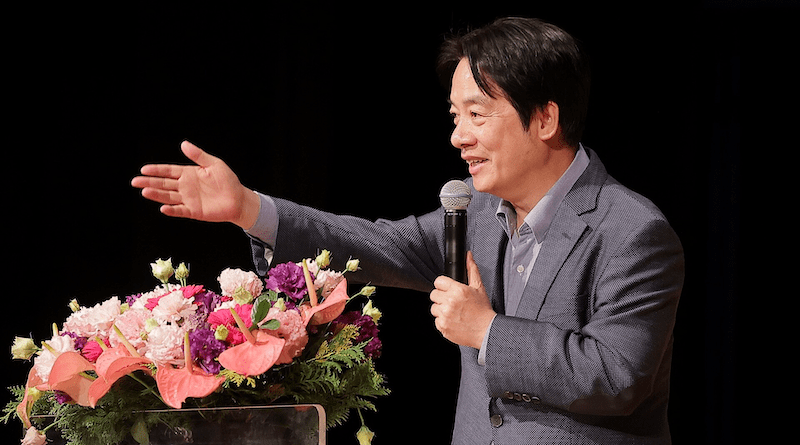Lai Ching-Te, NSP, And China: Future Predictions And Consequences – OpEd
Taiwan is scheduled to hold presidential elections on January 13, 2024. Currently, there are already three major candidates who will run. One of them is Lai Ching-te or William Lai from the Democratic Progressive Party. Lai could compete with two candidates from the Kuomintang, Hou Yu-ih and TaiwanPeople’s Party (TPP), Ko Wen-je.
In 2022, Forbes reported an article entitled, “One Of These Seven People Is Likely To Win Taiwan’s High-Stakes Presidential Vote In 2024, Gallup Pollster Says”, that Lai could be the strongest candidate to win, according to Gallup Market Research Taiwan Researcher, Tim Ting.
The position that will be held is quite vital for Lai, considering that currently, Taiwan is in a dangerous situation due to pressure from China. This pressure has occurred since President Tsai refuses to engage with Taiwan politically and economically.
As such, President Tsai fractured an alternative policy named the New Southbound Policy (NSP) in 2016.
More progressive?
NSP is a cooperation program for the entire country of the Association of Southeast Asian (ASEAN), six South Asian countries, and Australia and New Zealand that is related to the cultural, technological, agricultural and economic sectors.
This policy is expected to promote Taiwan’s “existence” in the Indo-Pacific while reducing dependence on China. In 2021, for example, NSP was used by President Tsai to diversify the economy. Compared to China, NSP countries absorbed 31% of Taiwan’s investment, increasing almost three times since 2016. Meanwhile, Chinese investment fell from 44% to 32%.
If Lai wins the election, it will likely significantly impact the NSP.
Taiwan is starting to explore relations with southern countries such as Malaysia and the Philippines in the trade sector. The two countries are among Taiwan’s top 10 trading partners. In 2021, the total trade between Taiwan and Malaysia increased by 29.8% from USD 19.34 billion to USD 25.11 billion. Besides that, Philippine exports increased by 17.37% in 2022 from USD 2.53 billion to 2.96 billion.
In the Tsai era, the education sector was also a priority to improve the capabilities of human resources (SDA), for example, in Indonesia. In mid-April, Indonesia – represented by the University of Indonesia (UI) – visited Taiwan to exchange and plan programs such as scholarships. According to John Chen, Head of the Taipei Economic and Trade Office (TETO), UI and Taiwan have been within the “Taiwan Studies Project” framework since 2020, which aims to send Indonesian students to study in Taiwan as if they were studying culture.
The development of NSP in the Tsai era was quite massive. It is hoped that Lai will encourage Taiwan to be known internationally through the NSP. South-South cooperation is believed to help Taiwan gain “recognition”. Lai is expected to push Taiwan’s foreign policy more progressively than Tsai, even though the consequences exacerbate the relationship with China.
To China: will it be much worse?
At the end of May 2023, the Guardian wrote that Lai was considered “greener” than Tsai. This means that Lai is predicted to worsen relations between Taiwan and China.
William Lai took over power after losing the local election and causing Tsai Ing-wen to step down from the DPP. Her perception of China is different when compared to Tsai’s slogan. Since the last election, the DPP has always used the slogan “resist China, protect Taiwan”.
This slogan was considered too radical and caused China to be more aggressive towards Taiwan. The Kuomintang (KMT), the opposition party, assumes that if the DPP controls Taiwan, it is inevitable that young people will become victims and members who will be put on the battlefield – to China.
Lai rejected Tsai’s “refined” slogan. The difference between Lai and Tsai is in the narrative or slogan used to defend Taiwan’s land. “Peaceful protection of Taiwan” is Lai’s vital slogan; Lai tends to use this narrative to counter the KMT’s lousy perception of the DPP.
Through this narrative, Political Observer Chen Kuo Hsing argues that China is predicted to be “softer” towards Taiwan. However, this is incorrect, considering that Lai once argued that independence would be obtained even if not declared. Lai says, “We have to be unified, continue to strengthen Taiwan, protect the democratic frontline and ensure Taiwan’s security,”.
Lai, furthermore, has proposed creating a program to open communication with China since Tsai launched an anti-China campaign. This communication is hoped to reduce the tension between Taiwan and China, which has increased in recent years. Taiwan’s Ministry of Defense report in early June 2023 identified 37 Chinese warplanes, such as the J-11 and J-16, passing through the air defence identification zone (ADIZ). Lai stated that Taiwan would commit to defending “sovereignty” if China attacked. This means Lai will “fight” China if necessary.
In conclusion, the NSP and China under Lai’s rule will have the same progressive fate. The difference is if the NSP continues to be an alternative for cooperation for Taiwan, China will become a significant threat to Taiwan. Lai, if he wins the election, must carefully consider his position as the executive chair, considering that the NSP and China are two components that should be considered.

